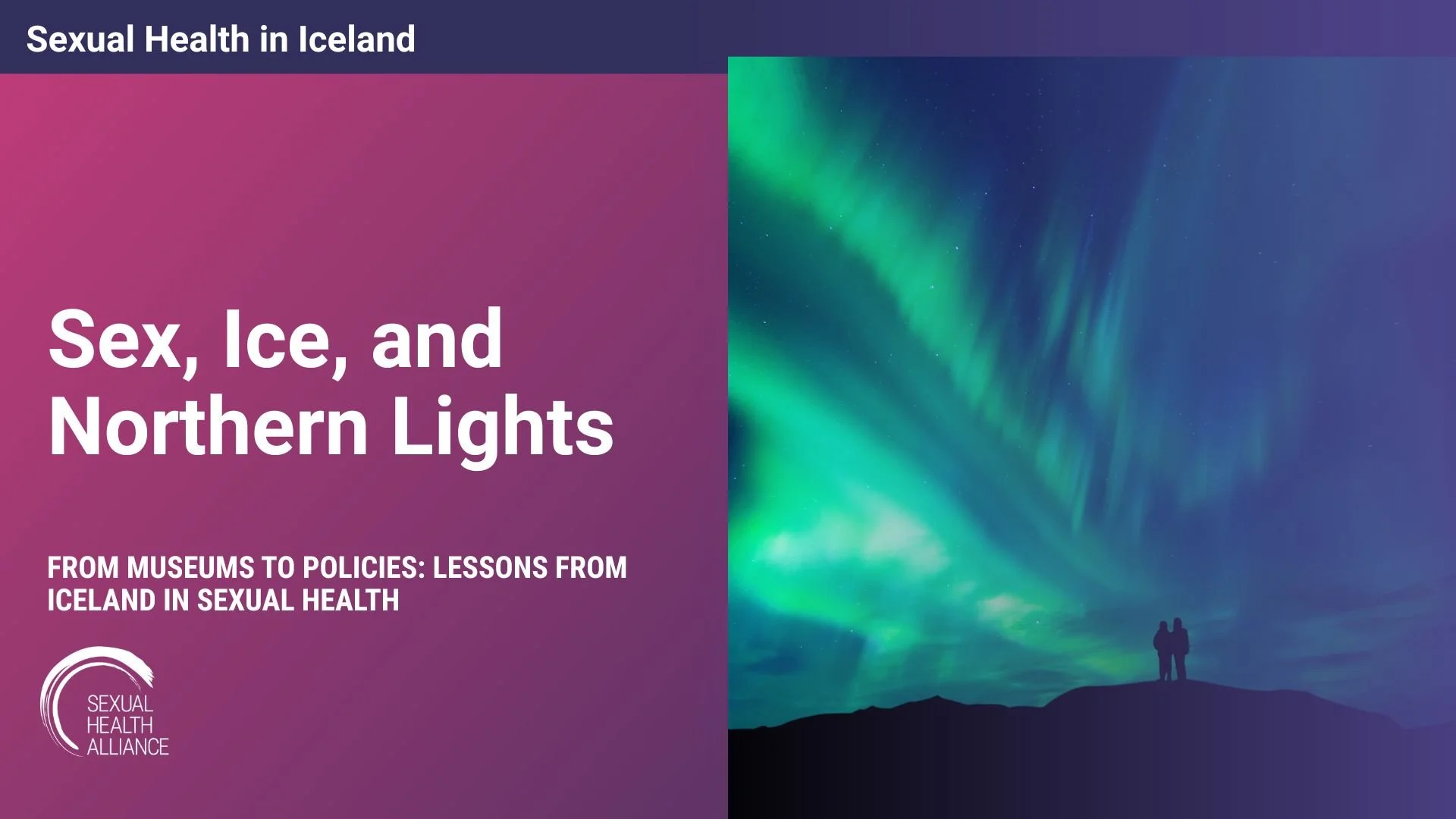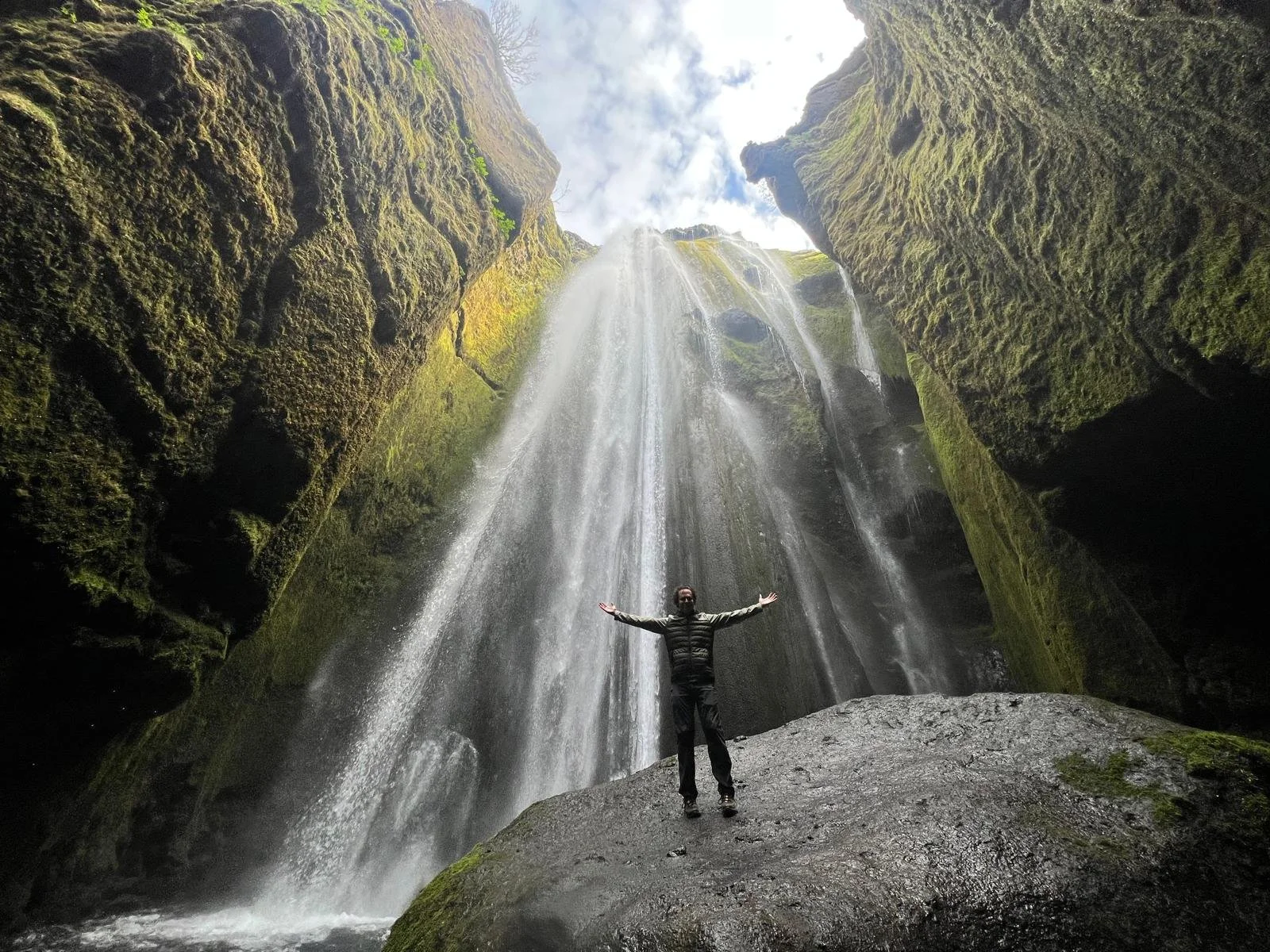SHA recently embarked on a study abroad trip to Iceland, and if you missed the stunning photos and fun facts shared, here’s your chance to catch up. From Reykjavík walking and biking tours to geothermal lagoons and the dazzling northern lights, the group soaked in all the country has to offer. They even visited the world’s only “genuine” Phallological Museum (yes, an entire museum dedicated to penises!).
But beyond the adventures, the trip focused on what makes Iceland truly unique: its open, progressive approaches to sex, sexuality, and gender. Along the way, the group met 3 sexual health professionals, half of all practicing sexologists in the country (that’s right – 6 in total!).
In this blog, we’ll share the key takeaways and highlights that made this journey unforgettable.
Fun facts about Iceland
Though Iceland looks big on the map, it has fewer than 400,000 residents (about the same size as New Orleans). Communities range from tiny towns of just a few dozen people to Reykjavík, where 64% of the population lives in and around the capital.
Known as the “land of fire and ice,” Iceland also has a reputation for progressive attitudes toward sex and sexuality. Blogs, news articles, and videos often highlight how openly people in Iceland approach conversations about sex, sexuality and relationships.
In such a small country, dating culture looks a little different. Instead of Tinder, the most popular app is Smitten, designed with Icelandic culture in mind. And because “everyone knows everyone,” Icelandic college students even created an app that let daters check whether they shared family genealogy before meeting up.
Sexual Health in iceland: Progressive laws and policies
Gender equality
Iceland consistently ranks among the most gender-equal countries in the world. Women participate in the labor force at some of the highest rates globally and now make up the majority of university graduates. Gender gaps remain, but Iceland continues to lead the way with strong policies and advocacy.
When it comes to gender equality, Iceland consistently ranks as one of the most egalitarian countries in the world. Women participate in the labor force at some of the highest rates globally and now make up the majority of university graduates. Gender gaps remain, but Iceland continues to lead the way with strong policies and advocacy.
LGBTQ+ Rights
Iceland is also one of the most LGBTQ+ friendly countries worldwide:
2010: Same-sex marriage became legal.
2019: The Gender Autonomy Act granted the right to self-define legal gender without medical diagnosis, introduced a third gender marker, and expanded protections for trans and nonbinary people.
Organizations like The Association ‘78 work with Reykjavík schools to integrate LGBTQ+ education, including gender identity, expression, and support resources for all ages.
The Reykjavík Rainbow Certification helps workplaces adopt inclusive practices and prevent discrimination.
Iceland has put efforts into providing various resources for LGBTQIA+ people. One study showed that there is high awareness and satisfaction of these resources.
Adolescent rights
Iceland prioritizes adolescent health and autonomy:
Consent: Age of consent is 15.
Healthcare: At 16, adolescents are considered independent patients, able to access birth control, abortion, and gender-affirming care without parental involvement.
Education: Comprehensive sexuality education is mandatory at all levels.
Sex worker rights
Red Umbrella Iceland works with current and former sex workers to advocate for rights. In Iceland, they’ve adopted the Nordic model (or the Sex Buyer Law) where selling sex is decriminalized, but it’s illegal for someone to buy it.
Pornography in Iceland
Pornography has technically been illegal since 1869. While laws still prohibit distribution, enforcement is rare, and porn remains accessible. In the early 2010s, debates increased about what to do with porn bans, but ultimately did not change much. Instead of focusing on bans, Iceland has shifted toward media literacy and education around pornography’s influence.
Sexual Health in Iceland: Sexuality and gender education
By law, sex education is mandatory in Iceland for students at every education level. Topics include:
Healthy relationships
Consent and boundaries
Sexual rights and values
Gender and sexuality
Body awareness and autonomy
Pleasure and anxiety
Iceland’s approach to sex education is inclusive, age-specific and progressive. Still, gaps persist; similar to the US, there is no set curriculum or established policies, which means the quality largely depends on teachers. A lack of teaching materials and training for teachers and staff also present challenges for sexuality education. To fill these gaps, the government is actively seeking to make more resources available; currently they are working to adapt some resources from YES, an organization based in Philadelphia, which provides consent-focused, intersectional sexuality education.
Parents and caregivers strongly support sex education as well. One study found a majority wanted comprehensive sexuality education in schools. This community buy-in has been a key driver of progress.
What sexual health professionals can learn
From Iceland’s example, we can take away several important lessons:
Normalize conversations: Open dialogue about sex and sexuality reduces stigma.
Invest in gender equality: Legal protections and education work hand-in-hand to shift culture as reflected in adolescent gender equality perceptions that have increased over time
Empower adolescents: Recognizing young people’s rights fosters autonomy and healthier choices.
Adapt resources thoughtfully: Age-appropriate materials (like YES curriculum) that are inclusive and intersectional should be adapted to fit context.
Early education: Comprehensive education is most effective when introduced from a young age.
Conclusion
Iceland may be small in size, but its impact on global conversations around sex, gender, and sexuality is huge. From progressive policies to strong community support, Iceland shows us how societies can prioritize equity, inclusivity, and open dialogue.
For sexual health professionals, the trip was more than sightseeing, it was a chance to reimagine how education, law, and culture can work together to support healthier, more inclusive communities.
Are you interested in learning from sexual health experts globally while building your sexual health community? SHA offers study advanced abroad programs to places around the world for immersive experiences with educational excursions and cultural insights.
Written by Emma Sell-Goodhand, MPH
Emma is a doctoral student and Global One Health Fellow at North Carolina State University studying adolescent sexual health. She brings prior experience as a Technical Advisor at the World Health Organization.
Want to become an in-demand sexual health professional? Learn more about becoming certified with SHA!







